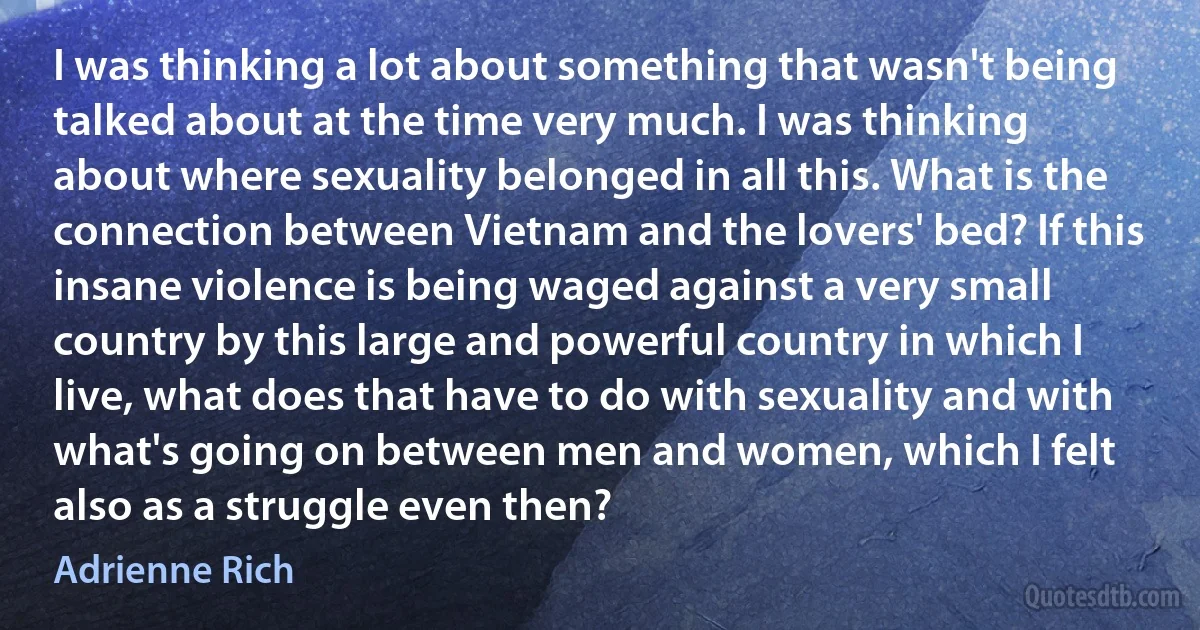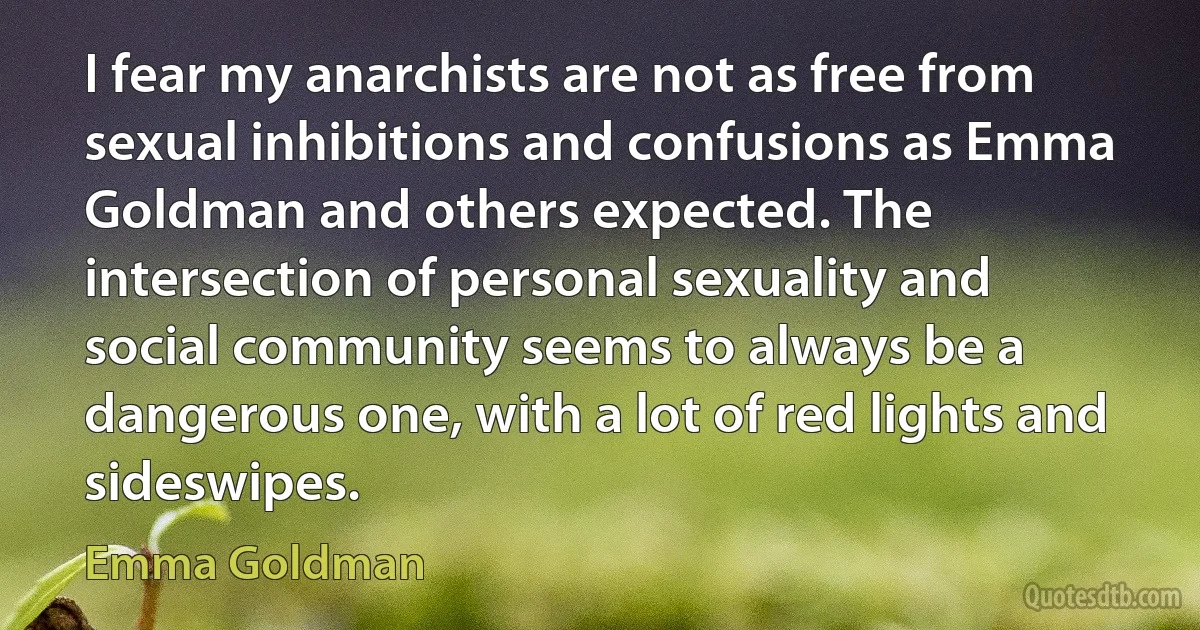Sexuality Quotes - page 14
Freud captured the imagination of a whole continent and civilzation for a good reason. Though on the surface inconsistent, illogical or "way out," his followers, with their cautious logic, their experiments and revisions have nothing comparable to say. Freudianism is so charted so impossible to repudiate because freud grasped the cruecail problem of moddern life: Sexuality.

Shulamith Firestone
Mumtaz was in the Marilyn Monroe-mould - every man's fantasy woman. She is or was, the kind of woman any man would want to pamper and bury in diamonds, silks, satins... She had a courtesan kind of charm. Absolutely top marks go to her as greatest sex symbol. She was cute, impish, voluptuous. The way she used her body was so natural. She looked juicy! Her smile, her eyes, her pug nose, she was all woman. I don't think anyone else projected sexuality the way she did. She was a raving beauty, and in person too, was very attractive. A great smile, a great sense of humour, and a very no-nonsense down-to-earth manner. She was one woman who did not antagonise other women. And I'm sure every man she met lusted after her. She seemed immensely beddable.

Mumtaz (actress)
I think of my suffering, of the problem of my suffering. What am I suffering from? From knowledge - is it going to destroy me? What am I suffering from? From sexuality - is it going to destroy me? How I hate it, this knowledge which forces even art to join it! How I hate it, this sensuality, which claims everything fine and good is its consequence and effect. Alas, it is the poison that lurks in everything fine and good! - How am I to free myself of knowledge? By religion? How am I to free myself of sexuality? By eating rice?

Thomas Mann
It's strange-you know, the Net is denounced as austere, the product of the engineering mentality, so forth and so on. It's the most feminine influence that Western civilization has ever allowed itself to fall under the spell of. The troubadors of the fourteenth century were as nothing compared to the boundary-dissolving, feminizing, permitting, nurturing nature of the Net. Maybe that's why there is an overwhelming male preference for it, in its early form, because that's where that was needed. But it is Sophia, it is wisdom, it is the penetrating archetypal female logos of the world-soul, leading us away from what was very sharp-edged and uncomfortable and repressive to our creativity and our sexuality and our relationships to each other and to the Earth.

Terence McKenna
What do these conventions mean? What does a nude signify? It is not sufficient to answer these questions merely in terms of the art-form, for it is quite clear that the nude also relates to lived sexuality.
To be naked is to be oneself.
To be nude is to be seen naked by others and yet not recognized for oneself. A naked body has to be seen as an object in order to become a nude. (The sight of it as an object stimulates the use of it as an object.) Nakedness reveals itself. Nudity is placed on display.
To be naked is to be without disguise.
To be on display is to have the surface of one's own skin, the hairs of one's own body, turned into a disguise which, in that situation, can never be discarded. The nude is condemned to never being naked. Nudity is a form of dress.

John Berger
What grew from from that discussion was the realization that in order for him to create an authentic alliance with me, he must deal with the primary source of his own sense of oppression. He must, first, emotionally come to terms with what it feels like to be a victim. If he-or anyone-were to truly do this, it would be impossible to discount the oppression of others, except by again forgetting how we have been hurt. And yet, oppressed groups are forgetting all the time. There are instances of this in the rising Black middle class, and certainly an obvious trend of such "unconsciousness" among white gay men. Because to remember may mean giving up whatever privileges we have managed to squeeze out of this society by virtue of our gender, race, class, or sexuality.

Cherríe Moraga
Part of me wonders if I should've labelled by characters according to contemporary definitions of gender and sexuality so there'd be no doubt in anyone's mind. To me, all of these labels are context dependent and therefore it does not feel authentic or organic to use words that have developed out of our contemporary discourse to describe my characters...

Rivers Solomon
Smith's book [Different for Girls] is, nevertheless, an acute and enjoyable analysis of misreadings and misrepresentations of women in popular culture. Put simply, her argument is that women are far less different from men than the media, religion, politicians, pundits and the fashion world would have it. And indeed there is a kind of ‘new woman' abroad: a more androgynous, much tougher creature than the postwar or even Sixties model. The new woman, according to Smith, enjoys her own power, her own money, her own sexuality. She can play with self-image without burning her fingers. She is unimpressed by the ever-after promises of marriage (or of men, as it happens) and the easy seductions of motherhood. Smith has often written on the growing numbers of women – one in five, the most reliable figure – who refuse motherhood, and is particularly scathing on the patriarchal implications of infertility treatment.

Joan Smith
You can create your own style, set your own standard of beauty, embrace your own sexuality. Think about an icon we just lost - Prince. He blew up categories. People didn't know what Prince was doing. ... And folks loved him for it.
You need to have the same confidence. Or as my daughters tell me all the time, "You be you, Daddy.” ... Sometimes Sasha puts a variation on it - "You do you, Daddy." ... And because you're a black person doing whatever it is that you're doing, that makes it a black thing. Feel confident.

Barack Obama
...Little Richard had that confidence because of the toughness of his early life. He used to talk about how his dad [a deacon who ran a nightclub] used to treat him [his father disapproved of his sexuality and beat him] and how he kept his head up. He was torn between rock'n'roll and the gospel all his life and he talked about that too – it affected him a lot and it was a battle that couldn't be won...

Little Richard
I've never wanted to call myself any sexuality, because I hate the idea of taking freedom away from you, and I think we all can be everything. I understand that at moments you have to define it, but my sexuality has been so wide and open, and that's what's influenced my way of working. I think it's given me freedom, my sexuality.

Mario Testino


